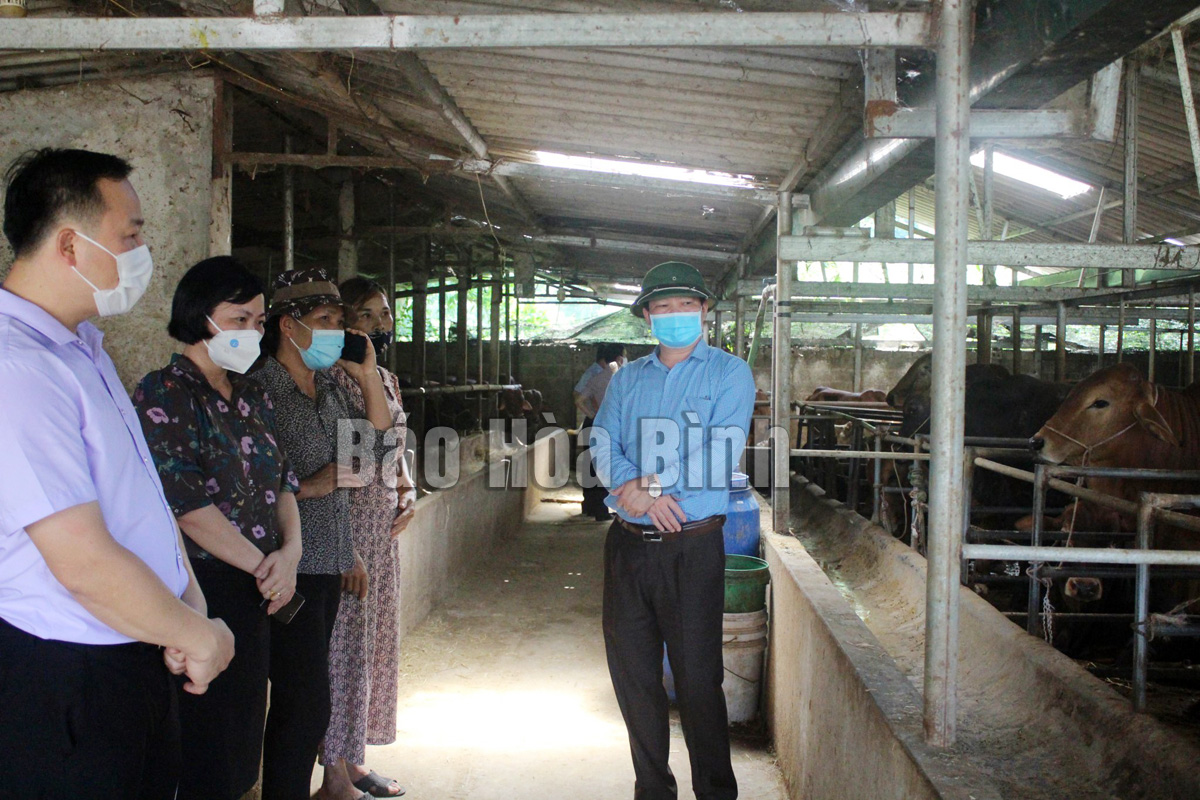
(HBO) – In recent years, localities in Hoa Binh province have seen a rise of agricultural models applying new production and business methods which have generated high economic benefits. Catching up with scientific and technological progress, farmers of the new era are making changes to their mindset and working methods to move close to smart agriculture, thereby raising the quality and value of farm produce, improving living standards, and contributing to local development.

Leaders of the provincial Farmers’ Union visit a cow
farming model in Yen Tri commune of Yen Thuy district.
Recently, farmers’ unions at all levels in Hoa
Binh province have stepped up communications to encourage their members to
apply scientific and technological advances, switch from small-scale economic
models to large-scale and concentrated production ones, and develop different
business models. They have reformed activities; improved the quality and
effectiveness of services, counselling, and vocational training; assisted
farmers to boost production and business; and coordinated with relevant
agencies to guide the formation of crop and animal farming cooperatives and cooperative
groups.
Since the beginning of 2021, all-level farmers’
unions have worked with banks to lend more than 3.58 trillion VND (157 million
USD) to over 5,100 farming households.
They have proactively coordinated with relevant
departments, sectors, and enterprises to train their members in internet use,
clean agricultural production, and food safety. Member farmers have been
encouraged to adapt crop and livestock structures to market demand.
Thanks to a movement calling on local farmers to
emulate in production and business, a large number of exemplars have appeared.
Le Van Thach, Chairman of the provincial
Farmers’ Union, said thanks to effective conselling, vocational training, and
support activities, the number of profitable cooperative models in agricultural
production and business activities has been rising. Many households are running
large-scale production models that bring about annual income of 600 million -
1.2 billion VND and higher.
That has contributed to the shift of rural
labour and economic structures to promote mass production and social stability,
as well as to the enhancement of people’s trust in the Party, State, and
farmers’ unions’ leadership, he added.
The Standing Board of the Hoa Binh provincial Party Committee has agreed in principle on a proposal by the Standing Board of the Party Committee of Hoa Binh city to gather feedback on the city’s 1:2000 zoning plan, which forms part of its broader urban development strategy.
Hoa Binh province has made notable progress in public administration reform and digital government development, with the satisfaction index among citizens and businesses reaching over 84%, according to recent government evaluations.
Thanks to great efforts by local authorities in recent times, the governance and public administration performance of Mai Chau district has been significantly improved.
In the afternoon of June 6, the Party Committee, the People's Council, the People's Committee and the Fatherland Front of Lac Son district solemnly held a meeting to celebrate the 139th anniversary of the district's founding (1886–2025) and the 79th anniversary of the establishment of the district's Party Committee (1946–2025). There was the attendance of Mr. Bui Van Thang, the Vice Chairman of the Provincial People's Council; Mr. Quach Tat Liem, the Vice Chairman of the Provincial People's Committee; Ms. Dang Bich Ngoc, the Deputy Head of the National Assembly Delegation of the province; as well as the former leaders of the province and district through various periods, who are the natives of the district.
Implementing the Politburo’s Resolution No. 57-NQ/TW on breakthroughs in science – technology, innovation, and digital transformation is a golden opportunity for the northern mountainous province of Hoa Binh to renew growth model, improve competitive edge and shorten digital gap.
Resolution 57-NQ/TW, issued by the Politburo on December 22, 2024, identifies sci-tech, innovation, and digital transformation as strategic breakthroughs to build a developed and prosperous nation. In Hoa Binh province, this spirit is not just a slogan, it’s being put into action through concrete initiatives that form a "new development triangle”: digital citizenship, digital economy, and digital administration.



